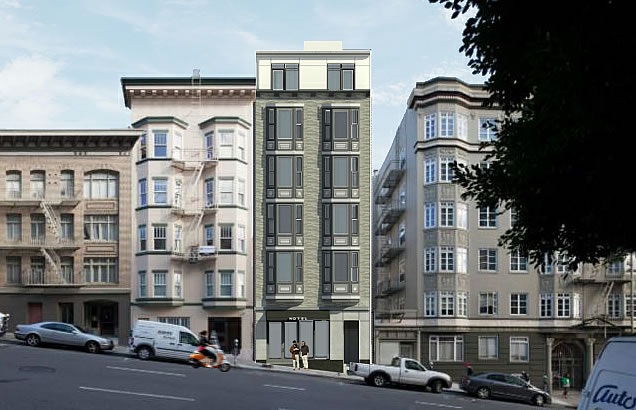The Board of Supes rejected a hotel project on Hyde Street today, sending a clear message that a residential building where tenants have been displaced by fire can’t be turned into another use.
It was also a sharp rebuke to the four Planning Commission members who were appointed by Mayor Ed Lee.

A developer who bought the site at 824 Hyde after a fire destroyed eight rent-controlled apartments decided to withdraw a plan to replace the housing and instead sought to build a 30-room hotel.
It was one of those moments when even longtime observers of the City Planning Department were boggled: Despite the housing crisis, despite the thousands of hotel rooms in the pipeline, despite the fact that there is not a single hotel in that residential part of Hyde Street, the planners approved the new hotel.
“I was at the hearing that day,” said Sue Hestor, a land-use lawyer who has been following the commission for more than 40 years. “The commissioners spent three hours talking about housing, and then voted for this project.”
Sup. Aaron Peskin asked the planning staffers working on the project if they could explain why the developer was allowed to shift from housing to a hotel on a site that had historically been housing. They had no answer except that both uses are legal.
The hotel was approved on a 4-3 vote, with all of the commissioners appointed by the mayor voting in favor and all of the commissioners appointed by the supervisors in opposition.
“This would be a policy statement that we don’t believe in the rights of tenants to return,” Peskin said. “This would be a statement that it’s okay to have a fire and tell people you can change the use and not allow return.”
He noted that “this is a teachable moment” for planning staff and the commission.
It’s rare for the supes to do this. I hope the Planning Commission (and the mayor) was listening.
Sup. Jane Kim is asking for what would be a fairly dramatic new requirement for dark money disclosures in San Francisco. She’s introduced legislation that would require that every registered voter receive an Ethics Committee mailing describing who is funding independent expenditures committees for local candidates and ballot measures.
The bill would also require regular updates on the Ethics Commission website revealing information about IE donors.
Kim also wants to make sure campaign mailers show more detail about who is funding the campaign.
It’s an effort to do something about the flood of misleading, dark-money driven expenditures that have been pouring into local elections. Just letting the voters know, for example, that an ad that says it was paid for by a local democratic club was actually funded by Airbnb, Facebook, and Ron Conway might help voters understand who is behind the candidates they’re considering.
To make this work, the Ethics Commission will have to do some additional work – some of these committees hide their donors behind state, not local, committees. But a public investigative team that helps voters understand dark money might have a positive impact on local elections.
Sup. Malia Cohen has picked up the Planning Commission’s call to put a hold on all new medical marijuana outlets in the city. She asked for a 45-day moratorium, and that will come up in September.
Meanwhile, despite some deep questions, the board approved Sup. Ahsha Safai’s proposal to ban any new dispensaries in D11.
Sups. Sandra Lee Fewer and Jane Kim voted against it, in part because it’s strange land-use planning: I don’t think there are many other rules controlling development of one type of business in one specific district. There are street-based and neighborhood-based rules, but this is a bit different.
And there were some interesting comments. Safai said that the MCDs in his district were not “nice cigar clubs” but “bars on the door” kinds of places. He noted that one applicant for a license in his neighborhood was arrested on murder-for-hire charges. Sup. Malia Cohen argued that “we are not getting the crème de la crème” of dispensary owners.
That’s a bit of a broad-brush claim about local pot clubs and their owners. Most of the ones I have met are local small business people who hire local employees and are good neighbors.
After an effort by Cohen and Safai to derail it last week, Peskin’s resolution opposing a really terrible state bill got approved today – after Cohen asked a few questions.
Among them: “Why is this undemocratic?”
It’s undemocratic, Peskin explained, because every member of the Board of Supes was elected with a 50 percent plus one majority rule, and every one of the many land use and tenant measures that have been on the ballot in San Francisco have passed or failed with a 50-plus-one rule, and now that state Legislature (not the voters) wants to impose a higher standard, just for a few big cities in California, on citizen initiatives involving land use.
That seemed to be enough of an explanation, and the resolution passed.
Now the supes are in recess for five weeks.







